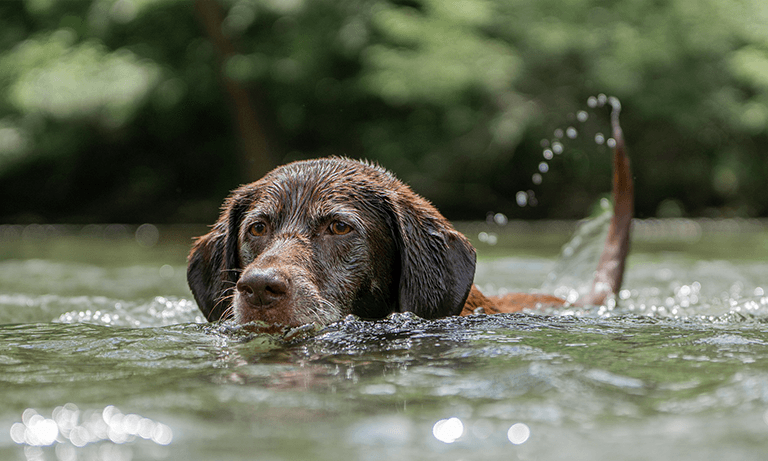British Veterinary Association responds to competition watchdog’s provisional decision and welcomes call for vet practice regulation
15 Oct 2025
The British Veterinary Association (BVA), British Small Animal Veterinary Association (BSAVA) and British Veterinary Zoological Society (BVZS) have updated their joint policy position on the use of parasiticides for dogs and cats.

As increasing evidence suggests substances commonly found in animal parasiticides like flea treatments are contaminating rivers and lakes, owners whose pets who enjoy swimming or are bathed are being encouraged to consider using alternatives to topical “spot-on” parasite products wherever possible.
Parasiticides are essential medicines in the prevention and treatment of parasites which, if left untreated, can cause serious implications for the health and welfare of both human and animals. However, as emerging evidence suggests chemicals like imidacloprid and fipronil are reaching rivers and lakes where pets are treated with “spot-on” treatments swim or through wastewater from homes where treated pets are bathed, the British Veterinary Association (BVA), British Small Animal Veterinary Association (BSAVA) and British Veterinary Zoological Society (BVZS) have updated their joint policy position on the responsible use of parasiticides for cats and dogs.
The updated position now recommends that wherever possible and reasonable, topical products should not be used on pets which are likely to swim or be bathed after treatment, and encourages veterinary professionals to have conversations with their clients to help tailor treatment plans to their individual needs.
BVA, BSAVA and BVZS already encourage veterinary teams to avoid blanket treatment and instead use a tailored, risk-assessed approach to prescribing the medication.
British Veterinary Association President Dr Rob Williams MRCVS said: “The use of parasiticides to protect human and animal health and welfare is essential but it is vital they are used and disposed of responsibly to minimise their impact on our planet. With more evidence coming to light to suggest that our rivers and lakes can become contaminated with these products due to treated animals swimming in them or being bathed after treatments, it is clear change is needed. We already encourage veterinary professionals to take a risk-based approach to prescribing these products and we would now ask vets and clients to include the animal’s swimming habits in these conversations and, where possible and reasonable, to use alternatives to spot-on treatments if they can if they are likely to swim or need frequent bathing. As with any medicine, each animal – and human client – will have their own unique needs and these all need to be taken into consideration when deciding on treatments.”
British Small Animal Veterinary Association President Dr Julian Hoad MRCVS said: British Small Animal Veterinary Association President Dr Julian Hoad MRCVS said: “Responsible use of parasiticides is integral to protecting pet health and supporting the One Health agenda. Recent research improves our understanding of how parasiticides can potentially contaminate the environment, particularly topical treatments. However, knowledge gaps remain including around the persistence of parasiticides in the environment and the potential for resistance to some products. . As veterinary professionals, it is incumbent on us to minimise the potential adverse impact of parasiticides on the environment whilst protecting animal and human health. BSAVA supports tailored, targeted treatments which benefit pet health yet at the same time address concerns. Taking a practical and proportionate approach to use parasiticides to best effect, empowers owners to make informed decisions, including around water-based activities and grooming. However, given the complexity of the small animal landscape it is essential that all involved collaborate to address the key issues to protect our combined health and the environment we share into the future. Tackling this One Health challenge is a joint endeavour.”
British Veterinary Zoological Society President Dr Elliott Simpson-Brown MRCVS said: "BVZS is pleased to see the publication of this policy position on responsible use of parasiticides, as it acts as an important indicator of the focus now being applied to the broader responsible use of veterinary medicines and associated impact on the UK wildlife and ecosystems as a whole. As a Society comprising of a broad span of veterinary professionals, involving those working with native wildlife, BVZS is proud to have contributed to this policy position with BVA and BSAVA."
Find the full BVA, BSAVA and BVZS policy position on parasiticides here: Responsible use of parasiticides for cats and dogs
| Join the conversation about sustainability at this year’s London Vet Show at Excel London from 20 - 21 November 2025. The BVA Congress session: Can we protect the environment whilst providing good clinical care? will be held at 12:30 – 1:45pm on Friday 21 November in the BVA Congress Theatre with Chair and BVA Junior Vice President Gwen Rees and speakers Catriona Curtis, Group Head of Sustainability at IVC Evidensia, Jon Haycock, Senior Veterinary Assessor at Veterinary Medicines Directorate and David Black, Director of Vet Sustain and Managing Director of Paragon Veterinary Group. |
Get tailored news in your inbox and online, plus access to our journals, resources and support services, join the BVA.
Join Us Today